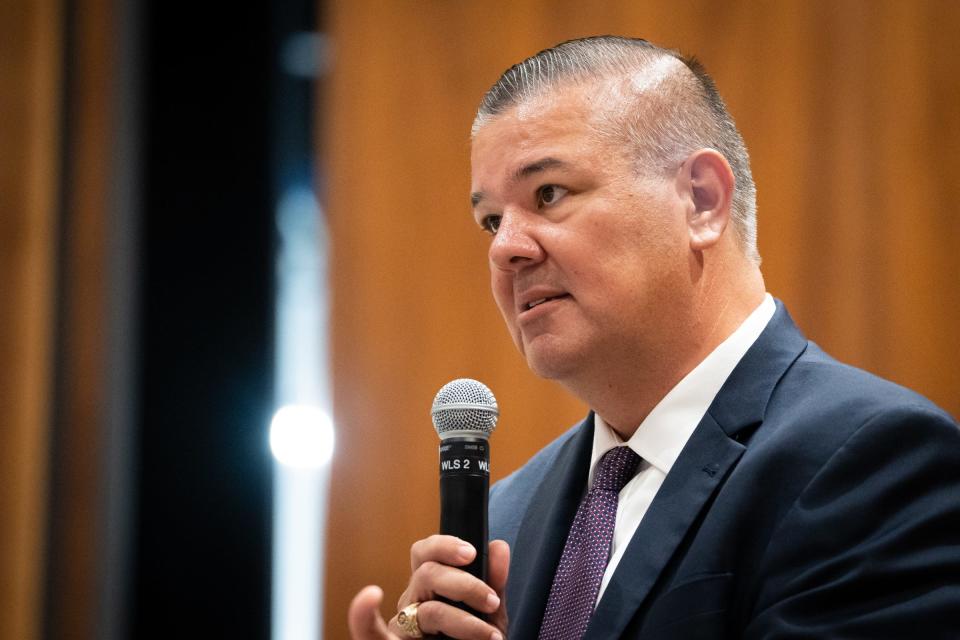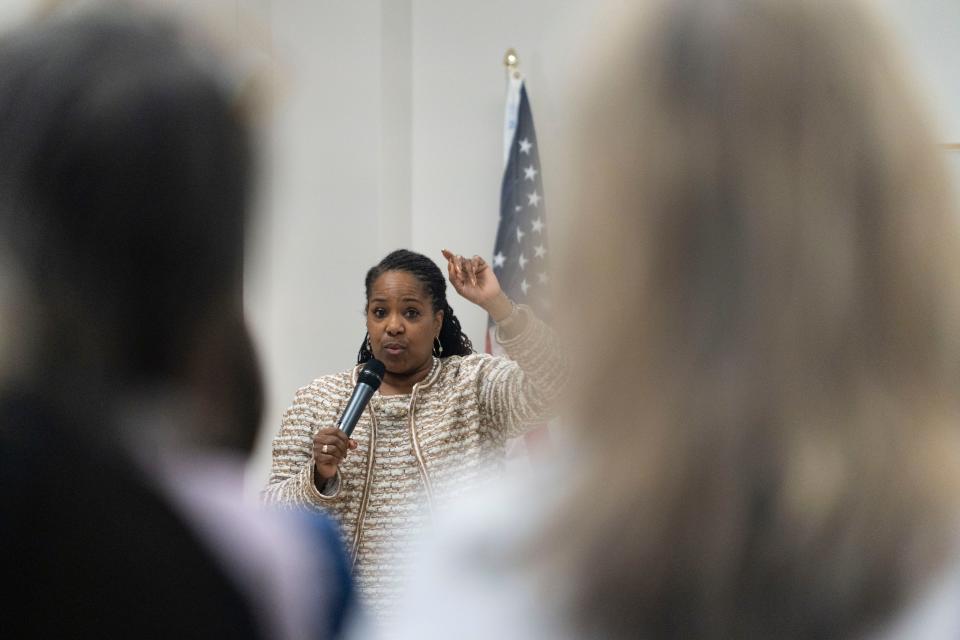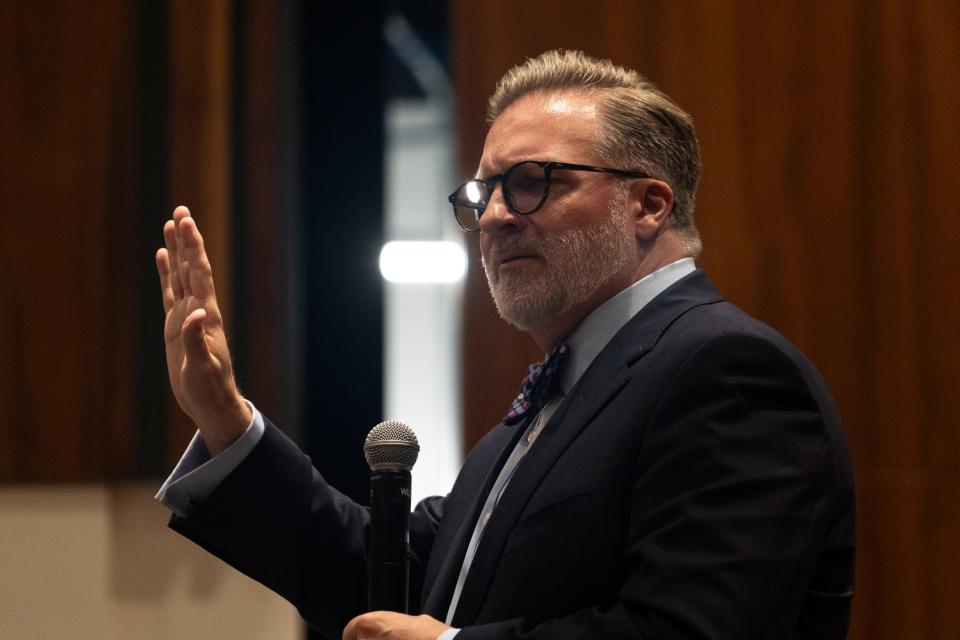ACC chancellor candidates visit Austin, answer community questions. Here's what they said.
The three finalists in Austin Community College's search for its next chancellor held in-person forums at campuses across the city to introduce themselves, lay out their visions for the institution and answer questions from the community.
In June, ACC named its finalists: Joyce Ester, president of Normandale Community College in Minnesota; Robert Garza, president of Palo Alto College in San Antonio; and Russell Lowery-Hart, president of Amarillo College.
The selected candidate will replace Richard Rhodes, who will leave Aug. 31 after leading the city's only public community college system for 12 years. The ACC Board of Trustees plans to visit the finalists' campuses and then make an offer to one of them before Rhodes leaves.
At the forums last week, students, staffers, faculty members and people in the community asked the candidates about a variety of topics, including how each would promote diversity, equity and inclusion; maintain a positive college culture; and reduce barriers to student success, such as food and housing insecurity.
Here's what the candidates said:
More: Austin Community College board names 3 finalists for chancellor. Who are they?

Addressing barriers to student success
To increase access to higher education for underserved populations, Garza said one option would be to host more community events to introduce younger Austin students to college campuses at an earlier age.
At all of the Alamo Colleges, including Garza’s Palo Alto College, seniors at local high schools receive free tuition for up to three years through the AlamoPROMISE program, and Garza said he’d look to implement a similar program at ACC.
“Now more than ever, we have to find ways to connect with our students because we have students that are living in poverty,” Garza said. “We have students that are homeless, that are food insecure (and) housing insecure."
Ester said ACC would first need to examine whether any of its internal policies and procedures were imposing barriers to student access. She also said it’s important to meet students where they are, noting that her current college has a “one-stop shop” model where students can come to one place for help for a broad array of services, such as financial aid or registration help.
More: ACC to launch eight-week business administration associate degree in fall

“We have to take responsibility because (the students are) paying us. The state's paying us. The community is paying us to do this work, and so the biggest thing is to get out of the way and make sure that we're doing what we need to do,” Ester said.
She also said colleges shouldn’t necessarily try to do it all, and so ACC could work with community service groups or faith-based organizations to help fill gaps in food and housing insecurity.
Lowery-Hart said increasing access requires dialogue with the community and “a deep dive in the data” in the different ZIP codes in the area to see the types of support that students in each area need.
He also said House Bill 8 — which will provide $683 million in additional funding for Texas community colleges — will provide a “critically important” opportunity to increase student wages.
“Austin can no longer afford just to be big and good,” Lowery-Hart said. “You've got to be great, and it's not enough just to provide access to people that haven't enrolled with you. You have to ensure that when they engage with you that they can finish.”
More: The Texas legislative regular session is over. What higher education bills passed?

Promoting positive campus culture, DEI at ACC
The three candidates emphasized their plans to uphold ACC's mission of diversity, equity and inclusion amid “the current legislative climate in Texas" as well as its strategies for building and maintaining a positive, supportive and inclusive college culture.
The discussions come a few weeks after Gov. Greg Abbott signed Senate Bill 17, which will prohibit diversity, equity and inclusion offices in Texas public higher education institutions, including ACC, starting in 2024.
Garza said it’s important for him and everyone in the college to treat people with respect, build a “culture of caring” and find common ground with students and other community members so ACC can achieve its goal of providing a strong education.
“When we tell folks that you can't do something because of the language that you speak, what you look like or who you are, I don't know about you, but I was raised differently," Garza said. “That's not right, and I think that that's why we have to come together and find those ways to champion education.”
More: U.S. Supreme Court overturns affirmative action. Here's what it means for Texas colleges.
Especially as someone who would be new to Texas, Ester said she’d aim to have an open door policy to engage with students and listen to the voices of faculty and staff members on committees. She said that will help people feel heard and allow her to get a better understanding of what’s happening throughout ACC’s campuses.
“At the end of the day, people are coming here to get credits and credentials and degrees, but they are also here to make sure that they find a place that is welcoming and accepting,” Ester said. “If we're talking about access and belonging, our faculty, our staff and our students need to see themselves in the stuff on the walls and the things that we talk about.”
Lowery-Hart said educating a diverse group of students at community colleges helps students thrive in their careers, which in turn fuels the economy and the success of local businesses. He said part of his job is showing lawmakers the “human side” of the debate over DEI and discussing the economic reasons that DEI is critical for colleges such as ACC.
“We have to be strategic and political in how we execute our ask from a Legislature that wants to demonize and make illegal the very people and activities that we know and love, so the frame for that has got to be an economic frame,” Lowery-Hart said.
This article originally appeared on Austin American-Statesman: ACC chancellor candidates visit Austin, speak on vision for college

